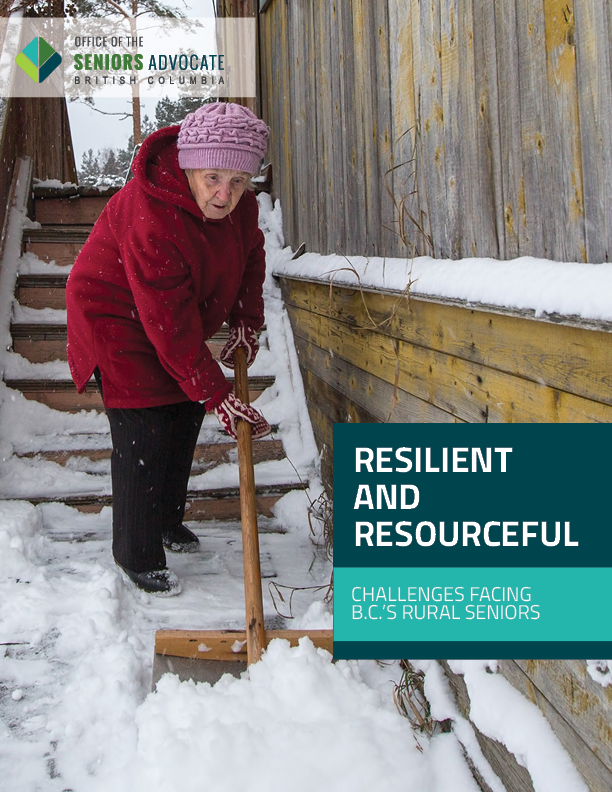Resourceful and Resilient: Challenges Facing B.C.’s Rural Seniors

In this report, Seniors Advocate Isobel Mackenzie summarizes the disproportionate challenges to healthy aging experienced by seniors living in B.C.’s rural communities.
‘Resilient and Resourceful: Challenges Facing BC’s Rural Seniors’ looks at the differences between rural and urban seniors’ populations and examines a range of services and supports to compare service levels between what is available in both rural and urban B.C. Overall, the report concludes that rural B.C. has a proportionately higher and faster growing seniors’ population with fewer resources and services when compared to the urban seniors’ population.
Highlights from the report include:
- Seniors are 25% of B.C.’s rural population compared to urban B.C. where seniors are 19% of the population;
- The seniors’ population in rural B.C. is growing faster than urban B.C. and by 2032, seniors will be 29% of the population of rural B.C. compared to 21% in urban B.C.;
- Seniors in communities in the Northern, Interior and Vancouver Island health authorities have a lower life expectancy compared to those in Vancouver Coastal and Fraser health authorities where more of the population is concentrated in urban centres;
- 17% of rural seniors do not have a family doctor or nurse practitioner compared to 13% of urban seniors, and hours and days of access to a clinic in rural communities are more limited compared to those in urban centers;
- 51% of seniors in rural B.C. communities are married, compared to 63% in urban areas with single seniors more likely to need home support, assisted living and long-term care;
- Rural seniors have both lower average and median incomes than their urban counterparts and their overall wealth is estimated to be two thirds less;
- The rate of acute care beds per 1,000 population is 70% lower in rural B.C. and the average length of stay as an alternative level of care (ALC) patient is 27% higher (85% of ALC patients are 65+);
The report makes seven recommendations:
- Develop and Implement a Rural Seniors Housing Strategy
- Develop and Implement a Rural Health Human Resource Strategy
- Develop and Implement Rural Seniors Home and Community Care Strategy
- Develop and Implement a Provincial Long-Term Care and Assisted Living Plan Based on Equity Throughout the Province
- Develop and Implement a Provincial Rural Transportation Strategy
- Improve and Better Promote both the Provincial Travel Assistance Program (TAP) and Hope Air
- Increase Rural Representation in Government through the creation of a Ministry or Minister of State for Rural B.C.
